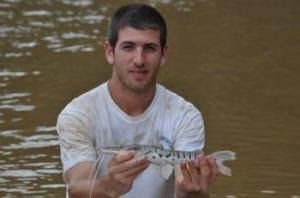i'Ve iNputted iNformation iNto iNaturalist
This is Devin Brown with one of 5,000 fish species identified in less than 24 hours using Facebook. He was mentioned by Scott Loarie today.
Yes I'm over iThings and eThings, but after a whirlwind presentation by Scott Loarie from Carnegie Institution at Stanford, I signed up to iNaturalist and entered my first observation, the basket fungus I posted about a few weeks ago.
I was a little uncertain whether I should add Podoscypha multizonata. Not because it's a fungus - I'm pretty tolerant of all life forms - but because it is saprophytic or parasitic on a planted tree in Kew Gardens. On the flip side, it's a species 'native' to the area and likely to be opportunistic on planted and naturally occurring trees.
In any case, the whole philosophy of this kind of 'crowd-sourcing' is to record all observations and then worry about their value later. Someone else can do the worrying...
iNaturalist is one of a number of places where you can post pictures of plants, animals, fungi, algae and other living things, with a more or less precise location (a 'georeference'), identified yourself or flagged for others to do.
It's linked to Flickr, Facebook, Twitter and the like, and Scott titled his talk 'Social Networks for Biodiversity Conservation'. His definition of iNaturalist (from his website) is "a natural history citizen-science social network to crowd-source data on climate impacts to biodiversity".
Scott started his talk with a picture he'd posted of an interesting bromeliad he noticed in a tree. Within minutes it was identified as Ball Moss, as species of Tillandsia.
He mentioned a few uses of the iNaturalist data and concept such as the Global AmphibianBioBlitz, where 10% of the world's amphibians were reported by 'citizen scientists' in 4 months. Observers included a US Army sergeant in Iraq who found a frog species outside it's natural range. As Scott put it, he was "in the right place at the right time" (which obviously depends on your perspective).
There have been discoveries of new species, such as a Dart Frog in Columbia, plenty of range extensions and rediscoveries of species thought to be extinct. For Scott, though, the big potential of iNaturalist is to track the impact of climate change on species. In particular, these citizen records can find extinctions at extremes of range and discoveries in newly colonised habitats.
Repeated surveys across time have so far provided the most interesting data for climate change (e.g. Sinervo and colleagues in the journal Science last year) but we need to scale up and make it more efficient. Scott is convinced that programs like iNaturalist can do this.
Scott also sees this kind of data supporting small-scale surveys, perhaps leading to the purchase of land important for conservation, while keeping stock of whole species range, on a regional or world scale.
Tricks and games are important in grabbing the attention of potential observers and the site needs to be kept active and fresh. Plants, Scott thinks, are good for monitoring climate change. Although birds are very popular for citizen scientists (e.g. eBird gets something like 3 million records a month) changes in their abundance may reflect things going on elsewhere in their yearly range if they are migratory.
People are already sharing photos in groups on Flickr and Facebook, with even scientists using it to get expert identifications. Scott mentioned Devin Bloom, photographed above, and how he used Facebook to get fish collected for his PhD identified (picture and story from Science News).
I was intrigued by the idea of linking these observations to 'scientific databases' like the Encyclopaedia of Life. It would be great to have these citizen observations streaming down the side so the 'experts' can look out for intriguing records and possible novelties. Already, I gather, assessments of the Red Listings (or rare plants and animals) use iNaturalist maps as part of the process.
So get started and add an observation to iNaturalist. Not only is it fun but to paraphrase Scott slightly: photo + georeference + expert opinion = useful observation.
Oh, and a postscript: I should have mentioned iSpot, a UK based 'place to share nature'. I'll get around to iNputting my fungus there too...
Oh, and a postscript: I should have mentioned iSpot, a UK based 'place to share nature'. I'll get around to iNputting my fungus there too...

Comments